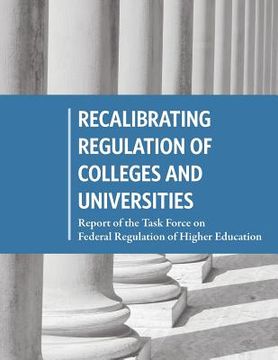Recalibrating Regulation of Colleges and Universities: Report of the Task Force on Federal Regulation of Higher Education (in English)
Synopsis "Recalibrating Regulation of Colleges and Universities: Report of the Task Force on Federal Regulation of Higher Education (in English)"
The federal government's substantial fiscal investment in higher education recognizes that postsecondary education is a linchpin in the nation's social and economic strength. Through that support, the government helps ensure that colleges and universities continue to contribute broadly to the fabric of American society. To ensure prudent stewardship of federal support for higher education, the Department of Education is charged with developing procedures to carry out laws passed by Congress in regard to higher education and with overseeing institutional compliance. Institutions of higher learning recognize the important role regulations play in the oversight of federal investments. Over time, oversight of higher education by the Department of Education has expanded and evolved in ways that undermine the ability of colleges and universities to serve students and accomplish their missions. The compliance problem is exacerbated by the sheer volume of mandates-approximately 2,000 pages of text-and the reality that the Department of Education issues official guidance to amend or clarify its rules at a rate of more than one document per work day. As a result, colleges and universities find themselves enmeshed in a jungle of red tape, facing rules that are often confusing and difficult to comply with. They must allocate resources to compliance that would be better applied to student education, safety, and innovation in instructional delivery. Clearly, a better approach is needed. In 2013, a bipartisan group of U.S. Senators recognized that the pending reauthorization of the Higher Education Act (HEA) creates an opportunity to consider these issues in depth. They established a task force of college and university presidents and chancellors to study federal regulation of higher education broadly and identify potential improvements. Looking at the landscape of regulation of colleges and universities writ large, the Task Force on Federal Regulation of Higher Education identified a number of challenges that are particularly problematic. As described in Section II of this report, we concluded that many rules are unnecessarily voluminous and too often ambiguous, and that the cost of compliance has become unreasonable. Moreover, many regulations are unrelated to education, student safety, or stewardship of federal funds-and others can be a barrier to college access and innovation in education. Based on extensive discussions, consultations with experts, and site visits to campuses, the Task Force identified specific regulations that are of major concern to higher education institutions. Section III details those concerns, which include problematic financial responsibility standards, confusion and inconsistency in reporting requirements for campus crime, overreach in authorization of distance education programs, inefficient rules concerning verification of financial aid eligibility, counterproductive micromanagement of the accreditation process, and policies that result in consumers being inundated with information of questionable value.The Task Force also reviewed the processes by which higher education regulations are developed and implemented, and offers several specific ideas for improvement. Section IV outlines recommendations that include asking the Government Accountability Office to review the Department of Education's methodology for estimating institutional costs of compliance with regulations; the creation of clear "safe harbors" for institutional compliance; the recognition of "good faith" efforts to comply; and several proposals for better practices by the Department.

